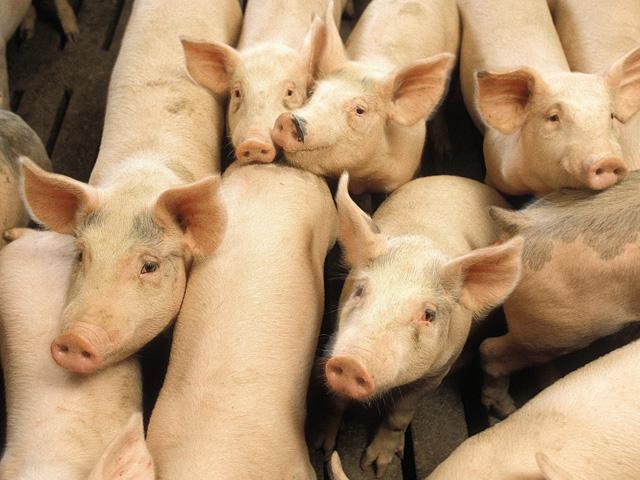FDA Approves Biotech Swine
Pigs Become First Genetically Altered Animals Approved for Food, Medical Use in US
OMAHA (DTN) -- For the first time, the Food and Drug Administration on Monday approved a line of genetically altered domestic pigs for food use and for human therapeutics to eliminate alpha-gal sugar, which can cause people to have an allergic reaction to red meats.
FDA had never approved an "intentional genomic alteration" in animals for both food and medical purposes. FDA Commissioner Stephen M. Hahn described Monday's action as "a tremendous milestone for scientific innovation."
Hahn added, "As part of our public health mission, the FDA strongly supports advancing innovative animal biotechnology products that are safe for animals, safe for people, and achieve their intended results. Today's action underscores the success of the FDA in modernizing our scientific processes to optimize a risk-based approach that advances cutting-edge innovations in which consumers can have confidence."
Prior to Monday, FDA had approved four genetically altered animals -- three for medical use and one for food use. For food, FDA had approved genetically engineered salmon in 2015.
GalSafe pigs would produce meat mainly for people affected by alpha-gal syndrome (AGS), which can cause anywhere from mild to severe allergic reactions from ingesting mammals -- mainly diagnosed when people become allergic to red meats -- pork, beef or lamb. Alpha-gal is a sugar found in mammal meat or blood, but not in humans. Alpha-gal syndrome is a fairly recently recognized allergy spread mainly through lone star tick bites. The expanded range of lone star ticks across the country has led to more diagnoses for alpha-gal syndrome in recent years.
Once people develop AGS, they become allergic to red meats and other products derived from cattle or hogs. That can include vaccines or other medicines derived from those animals as well.
P[L1] D[0x0] M[300x250] OOP[F] ADUNIT[] T[]
GalSafe pigs were genetically altered to eliminate the alpha-gal sugar from pigs' cells. Part of the FDA's review was to ensure the genomic alteration removed any detectable levels of alpha-gal sugars from multiple generations of the GalSafe pigs.
GalSafe pigs were created by Revivicor, a Virginia-based biotechnology company that was spun off in the U.S. from the United Kingdom company that produced the first cloned animal, Dolly the sheep. Revivicor was set up specifically to clone and genetically engineer pigs and their organics for medical applications, the company states on its website.
A spokesman for Revivicor said the company has been working on GalSafe pigs since 2007.
FDA officials stated Revivicor specifically wanted to receive approval to claim that meat or tissue products from the pigs are free of the alpha-gal sugar. As part of its review, FDA determined that food from GalSafe pigs is safe for the general population to eat. Revivicor told USDA the company intends to sell meat from GalSafe pigs through mail order.
Still, Steven Solomon, director of the FDA's Center for Veterinary Medicine, said Revivicor did not specifically claim GalSafe hogs would eliminate or prevent food allergies. The FDA also did not make any specific food-safety evaluations related to alpha-gal syndrome.
While Revivicor is based in Virginia, the GalSafe pigs are bred, farrowed and finished at a facility in Iowa, according to the FDA environmental assessment released in October. The company is approved for one location with one USDA-approved packing plant, which could lead to potentially 1,000 hogs. Right now, though, Revivicor has just 25 hogs it is raising, a spokesman stated to DTN.
The company plans to work with pork producers to market the meat and also work with medical companies for porcine parts -- valves, skin, thyroid hormone, etc. Revivicor's parent company plans to use GalSafe approval as a step in developing whole organs such as hearts or kidneys to be used for xenotransplantation into humans who need organ transplants, a spokesman said.
FDA stated GalSafe pigs may potentially provide a source of porcine-based materials to produce human medical products that are free of detectable alpha-gal sugar. For example, GalSafe pigs could potentially be used as a source of medical products, such as the blood-thinning drug heparin, free of detectable alpha-gal sugar. Tissues and organs from GalSafe pigs could potentially address the issue of immune rejection in patients receiving xenotransplants, as alpha-gal sugar is believed to be a cause of rejection in patients.
However, FDA also stated the pigs had not been evaluated to use for transplant products. Revivicor or another company would have to submit a separate application before those products could be used in human medicine.
While FDA was highlighting its regulatory success, the National Pork Producers Council has been critical of FDA's slow processes for approving scientific breakthroughs in genetically altering animals for either food use or medical purposes. NPPC has been pushing Congress to move oversight for genetically altered animals from FDA's oversight to USDA.
"NPPC remains firm that, in order for the tremendous potential of gene editing to be safely and readily available to U.S. farmers, regulatory authority for all agricultural applications of these new technologies has to be consolidated at the USDA," said Dan Kovich, NPPC's director of science and technology.
Still, Revivicor stated the company "applauds the FDA for the thoroughness of their review. The pathway for animal biotechnology is new, emerging, and uncharted. The FDA appropriately challenged every aspect of GalSafe technical submissions to ensure safety and efficacy. It was an exhausting comprehensive effort where the FDA-CVM and USDA maintained vigilance to safety and efficacy. The criticisms that the FDA has received from others are not warranted, in our team's view."
Chris Clayton can be reached at Chris.Clayton@dtn.com
Follow him on Twitter @ChrisClaytonDTN
(c) Copyright 2020 DTN, LLC. All rights reserved.






